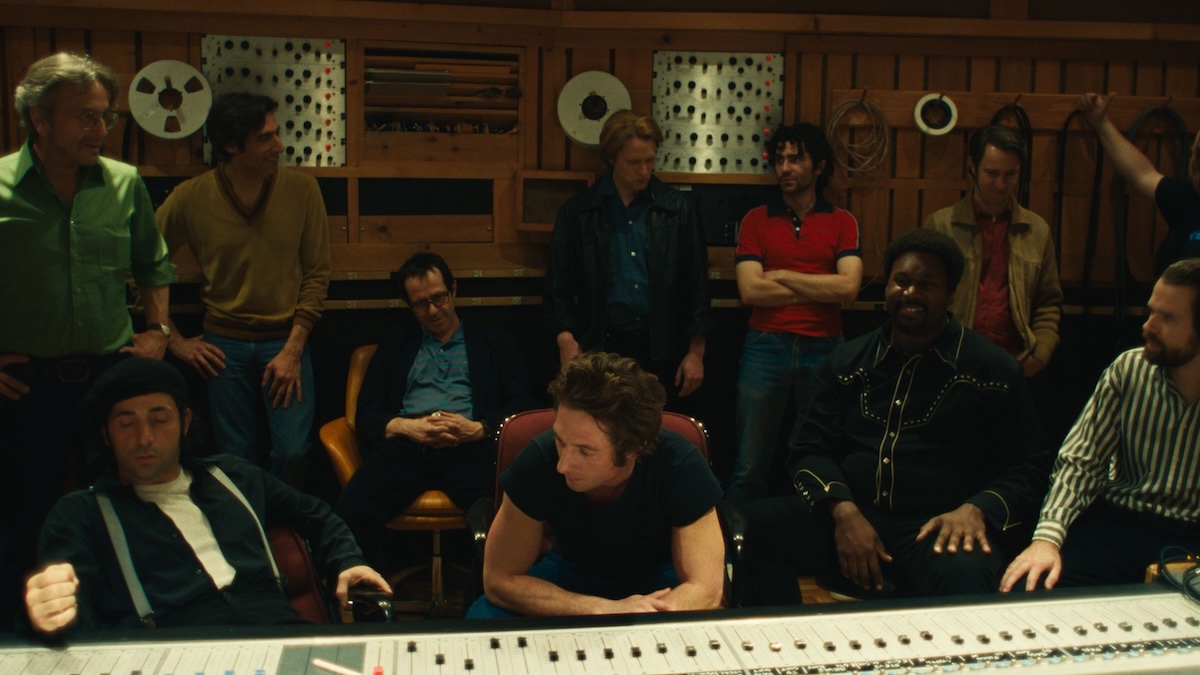SPRINGSTEEN: DELIVER ME FROM NOWHERE (2025)
Bruce Springsteen's journey crafting his 1982 album Nebraska, which emerged as he recorded Born in the USA with the E Street Band.

Bruce Springsteen's journey crafting his 1982 album Nebraska, which emerged as he recorded Born in the USA with the E Street Band.

It’s 1981, and a 32-year-old Bruce Springsteen is fast becoming one of the most famous musicians in the world after the success of his album The River. However, ‘The Boss’ is burned at the thought of superstardom and making another record that keeps his career on an upward trajectory. So, he returns to New Jersey to strike while the iron’s hot and make new music…
The bulk of Deliver Me From Nowhere takes place after Springsteen (The Bear’s Jeremy Allen White) sets up home in a rental in rural Colts Neck, New Jersey, where he’d write Nebraska, the anti-superstar acoustic album about blue-collar workers and heartland America. It’s the antithesis of Bob Dylan’s path in A Complete Unknown (2024), which saw him go from working-class hero to electric rock star.
The film would have benefited from recreating the themes of the Nebraska record instead of playing things safe. Based on novelist Flannery O’Connor’s stories, Terrence Malick’s Badlands (1973), and serial killer Charles Starkweather, Nebraska is a dark record about despair, isolation, and the seedy underbelly of America. It’s also about his unaddressed childhood trauma, heightened by his huge fame and long touring schedule. But instead of playing up the Americana tones of the record and making a visual ode to Malick’s classic, writer-director Scott Cooper (Antlers) turns this making-of-a-classic-album tale into yet another paint-by-numbers music biopic.

Fans of Springsteen will be aware of his era of despair. Just two years before Born in the USA turned him into a global icon, he was struggling with his mental health and the downsides of celebrity. Springsteen’s on record for talking about his rejection of commercial stardom and how it affected him psychologically, yet his generosity with his own truth is largely ignored in Deliver Me From Nowhere in favour of biopic clichés.
A romantic plot involving a fictional single mother, Faye (Odessa Young), is meant to symbolise the singer’s deep-rooted commitment issues. Instead, the relationship is a distraction from the key themes, not a wise addition. The couple frequently act out moments from Springsteen’s songs, implying he was inspired by their dates together. Fans will find themselves exasperated by the rewriting of the lore of this much-respected album, minimising many of the darker political themes of his lyrics. Deliver Me From Nowhere is at its best when it’s authentic and not deviating into plot devices.
Springsteen’s long-term manager, Jon Landau (Jeremy Strong), and Columbia exec Al Teller (David Krumholtz) solely exist as the devils on his shoulder to remind Bruce that he needs to make money, not art. Nebraska is still a celebration of artistry over commercialism, and while the film also celebrates this musical triumph, it fails to recreate the same ethos. Any boardroom scenes feel like they were written by A.I., lacking any pathos.

One of Deliver Me From Nowhere’s strongest points is that it’s a fixed moment in a career instead of rushing through the decades. This is slightly derailed by monochrome flashbacks depicting his relationship with his violent father (Stephen Graham) and vulnerable mother (Gabby Hoffman). A smarter film could have hinted at this childhood, which still affected a grown Bruce, without needing to play it out in melodramatic flashback scenes.
This film is ultimately a shallow exploration of Springsteen’s superstar trappings and how song is the ultimate form of therapy. There’s a lot of potential in taking one small portion of a musician’s long career to define him as a whole, yet this biopic gets stuck in telling us about the singer’s feelings. Springsteen cuts himself as an introverted figure who thinks more than he says, which doesn’t make him the best subject for a film.
The script prefers to explain Bruce’s mental state through cringeworthy dialogue rather than subtly showing it through his actions. Springsteen has multiple cliché angry man having breakdown moments, including driving his car too quickly, hitting his steering wheel in anger, and staring solemnly into space. As Bruce gets stuck in a rut, so does the film, repeating the same three obsessions in his life.

Because Springsteen spends much of the film sitting on the floor alone, thinking about writing songs, so scenes where he gets up on stage are a breath of fresh air. The singer frequently plays with a local band in a bar and covers the classics, remembering why he loves his job. These scenes, especially a mid-film moment where he covers “Lucille,” give Deliver Me From Nowhere a much-needed energy boost. While Bruce is a quiet introvert off-stage, he comes to life on-stage, and this is also reflected in White’s performance.
Deliver Me From Nowhere ultimately commits the crime of being boring. There was potential here to explore male mental health, the price of fame, and the scars left by our parents. Instead, Cooper uses cheap emotional shortcuts to tell Springsteen’s story. This is a movie that tells you people are struggling and never shows it. A message at the end encourages the audience to seek help, but where was this message during the film?
Jeremy Allen White does a decent job as The Boss. With uncanny brown contact lenses and the uniform of a plaid shirt, a leather jacket, and blue jeans, he certainly looks the part. But his performance is occasionally one-note, delivering monologues about mental health with little emotion. White would have benefited from a script with more emotional heft and less posing. White also provides the vocals for The Boss on-screen, studying with vocal coaches and guitar experts for months, and the results are effective. He sounds enough like Springsteen for the performance to not come across like a karaoke act. So while he never fully disappears into the role, he definitely captures Springsteen’s essence.

The supporting cast don’t get the time or material they deserve. Jeremy Strong recycles his role from The Apprentice (2024), as another deadpan suit manipulating a younger mentee. David Krumholtz is severely wasted in a blink-and-you-miss-it role as a music exec repeating cliché lines, as is comedian Marc Maron as a record producer, who never gets to unleash his deadpan charm. Stephen Graham, while incapable of delivering a bad performance, treads on well-worn ground as his aggressive and violent father. It’s a weaker, one-dimensional version of a character Graham has played multiple times. His terrible old-age make-up also dampens their emotional father-son reconciliation later in the film.
No matter how good the actors are, the characters are never developed enough for their skills to be fully utilised. Bruce’s parents feel more like stereotypes of an abusive couple of the era, rather than layered, real people to sympathise with. Even Springsteen himself, a man who’s bared his soul on record for decades, is drawn thin and painted broadly.
Springsteen: Deliver Me From Nowhere will likely appeal more to those not already indoctrinated into the world of The Boss, as it fails to be half as interesting as Bruce’s many podcasts, interviews, and Broadway shows. So for those unaware of the musician’s work outside of the hits, it’s a bland but not un-entertaining exploration of the lesser-known part of Springsteen’s life.
USA | 2025 | 119 MINUTES | 2.39:1 | COLOUR | ENGLISH


director: Scott Cooper.
writer: Scott Cooper (based on the book by Warren Zanes).
starring: Jeremy Allen White, Jeremy Strong, Paul Walter Hauser, Stephen Graham, Odessa Young, Gaby Hoffmann, Marc Maron, David Krumholtz, Johnny Cannizzaro, Harrison Gilbertson, Chris Jaymes & Grace Gummer.
